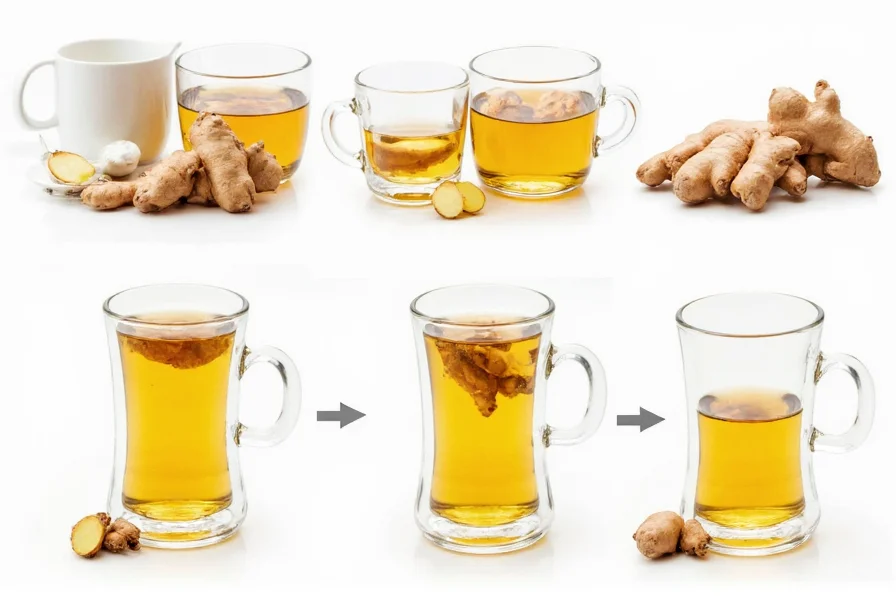Ginger tea has been used for centuries across various cultures for its medicinal properties. Modern research continues to validate many of these traditional uses, revealing specific mechanisms behind ginger's therapeutic effects. This comprehensive guide examines what ginger tea helps with based on current scientific evidence, separating fact from folklore while providing practical usage recommendations.
The Science Behind Ginger's Therapeutic Properties
Ginger (Zingiber officinale) contains bioactive compounds, primarily gingerols and shogaols, responsible for its distinctive flavor and medicinal properties. These compounds demonstrate potent anti-inflammatory and antioxidant effects in numerous clinical studies. Unlike many herbal remedies with limited scientific backing, ginger has been extensively studied for various health conditions, making it one of the better-documented natural remedies.
Digestive Health Benefits of Ginger Tea
Ginger tea helps with digestive issues by accelerating gastric emptying and reducing intestinal cramping. A 2021 review published in Nutrients found that ginger significantly improved symptoms of functional dyspepsia, including bloating and early satiety. The tea stimulates digestive enzyme production while relaxing the intestinal tract, making it particularly effective for:
- Relieving nausea from morning sickness (studies show 70% reduction in symptoms)
- Reducing chemotherapy-induced nausea
- Alleviating motion sickness during travel
- Decreasing postoperative nausea
- Managing irritable bowel syndrome (IBS) symptoms
| Condition | Effectiveness | Recommended Dosage |
|---|---|---|
| Morning sickness | High (1-1.5g ginger daily) | 2-3 cups of strong ginger tea |
| Postoperative nausea | Moderate to High | 1g ginger 1 hour before surgery |
| Digestive discomfort | Moderate | 1-2 cups after meals |
| Motion sickness | Moderate | 1 cup 30 minutes before travel |
Inflammation and Pain Management
What does ginger tea help with regarding inflammation? Research demonstrates ginger's effectiveness in reducing inflammatory markers. A double-blind study in Arthritis found that participants with osteoarthritis who consumed ginger extract experienced significant pain reduction compared to placebo. The anti-inflammatory effects work through multiple pathways:
- Inhibiting COX-2 enzymes (similar to NSAIDs but without the side effects)
- Reducing prostaglandin synthesis
- Decreasing cytokine production
- Lowering oxidative stress markers
Ginger tea benefits for pain management include relief from menstrual cramps, muscle soreness after exercise, and joint pain associated with arthritis. Consuming 2-3 cups daily provides optimal anti-inflammatory effects without adverse reactions for most people.

Immune System Support and Respiratory Health
When exploring what ginger tea helps with during cold and flu season, research indicates several immune-boosting properties. Ginger contains gingerol, which has demonstrated antiviral activity against respiratory syncytial virus (RSV) in laboratory studies. The tea's warming properties help loosen mucus and soothe sore throats, while its antioxidant content supports overall immune function.
A 2022 study in Phytotherapy Research found that ginger compounds enhanced the activity of immune cells while reducing excessive inflammation that can damage healthy tissue. This dual action makes ginger tea particularly valuable for managing upper respiratory infections without suppressing the body's natural immune response.
Blood Sugar Regulation and Heart Health
Emerging research suggests ginger tea helps with blood sugar management. A meta-analysis in Complementary Therapies in Medicine concluded that ginger supplementation significantly reduced fasting blood sugar and HbA1c levels in people with type 2 diabetes. The mechanisms include:
- Enhancing insulin sensitivity
- Reducing oxidative stress in pancreatic cells
- Inhibiting carbohydrate-digesting enzymes
- Improving lipid profiles
Regular consumption of ginger tea may also support cardiovascular health by reducing blood pressure and improving cholesterol levels. The anti-inflammatory effects contribute to better endothelial function, which is crucial for maintaining healthy blood vessels.
How to Prepare Ginger Tea for Maximum Benefits
To maximize what ginger tea helps with, preparation matters. Fresh ginger contains higher concentrations of active compounds than dried or powdered forms. For optimal extraction:
- Peel and thinly slice 1-2 inches of fresh ginger root
- Simmer in 2 cups of water for 15-20 minutes (longer simmering increases potency but may make it more bitter)
- Add lemon juice to enhance absorption of gingerols
- Include a small amount of healthy fat (like coconut oil) to improve bioavailability
Dried ginger powder works well too, but use 1 teaspoon per cup of boiling water and steep for 10 minutes. Avoid boiling ginger for extended periods as this can degrade some beneficial compounds.

Safety Considerations and Potential Side Effects
While ginger tea helps with numerous conditions, it's not appropriate for everyone. Potential side effects include heartburn, mouth irritation, and increased bleeding risk. People taking blood thinners should consult their doctor before regular consumption. The recommended daily limit is 4 grams of ginger (approximately 3-4 cups of strong tea).
Pregnant women can safely consume up to 1 gram daily for nausea relief, but higher doses may affect fetal development. Those with gallstones should avoid ginger as it stimulates bile production. Always consult with a healthcare provider before using ginger tea for medicinal purposes if you have underlying health conditions or take prescription medications.
Conclusion: Evidence-Based Benefits of Ginger Tea
Research confirms that ginger tea helps with specific health concerns, particularly nausea, digestive issues, inflammation, and immune support. Its effectiveness varies by condition, with the strongest evidence supporting its use for nausea relief and digestive health. When incorporated as part of a balanced approach to wellness, ginger tea offers a safe, natural option for managing several common health concerns without the side effects of many pharmaceutical options.
Frequently Asked Questions
What does ginger tea help with for digestion?
Ginger tea helps with digestion by accelerating gastric emptying, reducing bloating, and alleviating symptoms of functional dyspepsia. It stimulates digestive enzymes while relaxing intestinal muscles, making it effective for indigestion, IBS symptoms, and general digestive discomfort when consumed after meals.
How quickly does ginger tea help with nausea?
Ginger tea typically begins reducing nausea within 20-30 minutes of consumption. For motion sickness, drink 30 minutes before travel. For morning sickness, effects are noticeable within 30-60 minutes. Maximum nausea relief occurs about 1-2 hours after drinking the tea, with effects lasting several hours.
Can ginger tea help with weight loss?
While ginger tea alone won't cause significant weight loss, it may support weight management efforts. Research suggests ginger can increase thermogenesis (calorie burning), reduce inflammation associated with obesity, and help control appetite. When combined with a healthy diet and exercise, ginger tea may provide modest support for weight loss efforts.
Is it safe to drink ginger tea every day?
Yes, drinking 1-3 cups of ginger tea daily is generally safe for most adults. The recommended maximum is 4 grams of ginger per day (approximately 3-4 cups of strong tea). Long-term daily consumption within these limits shows no significant adverse effects in research studies, though those with specific health conditions should consult their healthcare provider.
What's the best time to drink ginger tea for maximum benefits?
The optimal timing depends on your health goals: morning for nausea relief and metabolism boost, after meals for digestion, before bed for relaxation (use weaker brew), and before exercise to potentially reduce muscle soreness. For general wellness, spreading 2-3 cups throughout the day provides consistent benefits without overwhelming your system.











 浙公网安备
33010002000092号
浙公网安备
33010002000092号 浙B2-20120091-4
浙B2-20120091-4